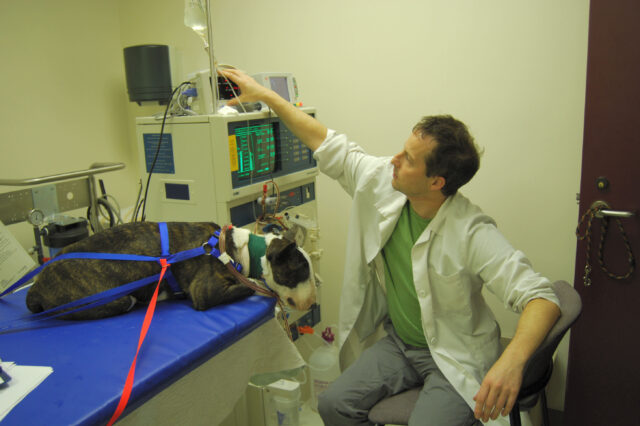UF, Penn collaboration results in canine kidney transplant

Carsten Bandt, a specialist in veterinary emergency medicine and critical care, monitors the vital signs of a 14-month-old bull terrier during one of several hemodialysis treatments the animal received at the University of Florida's Veterinary Medical Center in August. The treatments were necessary to build the dog's strength before it received a new kidney at the University of Pennsylvania. (Photo by Sarah Carey)
Thanks to a unique collaboration between the University of Florida and the University of Pennsylvania, a 14-month-old bull terrier named Zansi is recuperating well at her home in St. Petersburg after successful kidney transplant surgery Sept. 4.
The case represented the first time a patient has received hemodialysis at the UF Veterinary Medical Center and the second time a dog has received a kidney transplant at the University of Pennsylvania School of Veterinary Medicine.
Zansi's litter mate, Toni, provided the donor kidney, said their owner, Jennifer O'Brien. The dogs were imported from a South African breeder.
"Zansi and Toni are both doing wonderfully," O'Brien said Sept. 14. "As far as I can tell, everything is going great."
Soon after Zansi arrived from South Africa, O'Brien noticed she was not eating well and was drinking large amounts of water. Eventually she found an internal medicine specialist in Clearwater who diagnosed kidney disease.
"I began pounding the pavement, doing a lot of research on the Internet to see what our options were," O'Brien said.Although a few other veterinary hospitals in the United States can provide canine kidney transplants, she determined that Penn Vet was logistically her best option for the procedure. There was one problem, however — after the rigorous work-up process Zansi underwent at Penn Vet, she was not medically stable enough for surgery.
While equipped to perform the transplant operation, Penn Vet's hemodialysis program is on hold. Hemodialysis is a procedure through which kidney function is mechanically taken over until the patient is stable enough to receive a donor kidney.
The roles of both veterinary colleges were critical in Zansi's care, which led to a first-of-its-kind collaboration between the two institutions.
"We were lucky enough to come across Dr. (Carsten) Bandt and the University of Florida," O'Brien said.
Bandt, an assistant professor of critical care and emergency medicine at UF, has a background is in hemodialysis and nephrology.
Through hemodialysis, symptoms known as uremic syndrome — witnessed through clinical signs such as loss of appetite, weakness, seizures and vomiting — can be greatly reduced or eliminated.
"There are only a few veterinary centers capable of doing intermittent hemodialysis," Bandt said. Because of Bandt's expertise, UF joined that elite group and Zansi became the first patient ever to receive the procedure at UF veterinary hospital.
Hemodialysis treatments typically last between five and six hours and most dogs need three treatments per week, Bandt said. Zansi, who still had some kidney function, was able to get by with two weekly treatments.
"She was a rare exception, but she did very well," Bandt said.
Following her treatments, Zansi was deemed stable enough for surgery after gaining weight and displaying an improved appetite and attitude. On Aug. 31, Zansi and Toni headed to Pennsylvania for the transplant operation.
Drs. Lillian Aronson and Heidi Phillips performed the surgery. Phillips said transplants are not recommended for all dogs with kidney disease. Animals with infections or recurring infections or that have cancer are not good candidates for kidney transplants, she said. Aronson initiated Penn Vet's feline renal transplantation program, which recently celebrated its 100th surgery.
"It is a rare procedure in dogs," Phillips said. "We can only use dogs that are related to each other at this time. In cats we can use unrelated donors, because they are able to suppress their immune system with medication. They respond to the immune suppression medication better than dogs do.''
O'Brien called Penn's veterinary team "very gracious and professional."
"I also feel very strongly about UF, as I come from a family of Gators," she said. "We have had such a positive experience and I am so impressed with all of the people in the dog nephrology world. They are some of the nicest people I have ever come across."
The message O'Brien would most like to convey, however, is for people with dogs in need of such treatments to know there are options for them to receive help.
"I would like to see these options more accessible and more available to the pets that need them," she said.
About the author
